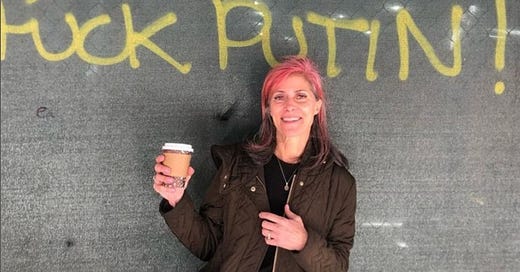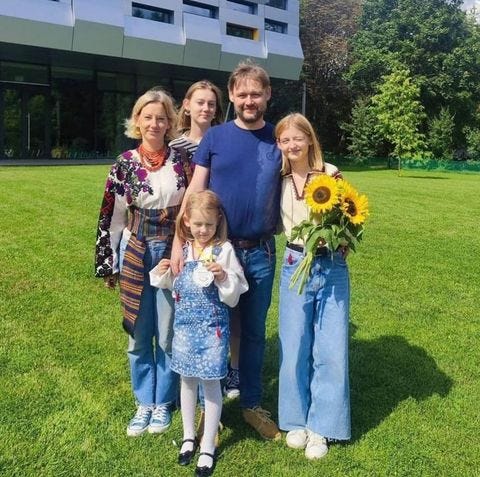“[The Russians] always claim to free us and to help us. They free us from our houses, schools, hospitals, from our families, from everything. They want to make us completely free, and maybe even from our bodies.” - Oksana Hutnyk
It is the 29th of September, 2024, and I'm going to take us back a few years to, February 24th, 2022, the day Russia invaded Ukraine and started a war that is ongoing. We are going to hear from two people in Lviv, Ukraine, and by way of introduction, I'd thought I’d tell you how I know them.
I wound up in Ukraine on March 4th of 2022, a little over a week after the war started. I got over there simply because I wanted to go. Michael Moynihan of The Fifth Column podcast was then at Vice News. He was going to be heading over and I said, Hey, can I tag along with your crew? He said, sure. But then his trip was delayed.
I had already bought my ticket, so I headed over alone. I'm not a war correspondent, and I was only in Ukraine for about a week, so I'm not telling you some super-secret anything, but it is the case that you learn very quickly what the fog of war means, because nobody really knows what's going on. Modes of communication had been cut. I don't speak Ukrainian. It was a tense time, obviously; the country's being invaded.
I wound up in Warsaw and had no idea how I was getting into Ukraine. You can't take a bus, you can't take a plane, you can't drive over. But I got a DM from a woman on Twitter; I'll call her T. She was from the area around Lviv, Ukraine. She lived in Portland, Oregon now and had been following my reporting from that city in 2020 and 2021. She contacted me and said, Listen, I have a friend in Lviv. If you can get there, I'm sure you can hook up with her. I'm like, that sounds great.
I bought what I thought was a bus ticket to the border, to Przemyśl in Poland. It turned out to be a train ticket. On the train, I met a Ukrainian who was coming from Holland. Vitaly had been working there and was going back to Odessa. He had to. All Ukrainian men between certain ages were being called back to fight, and those in-country were not allowed to leave. The elderly and some women and children were allowed to get out. Anyway, Vitaly was also going back because he had family in Odessa. They'd been staying in his house; his sister and nieces and nephews. He's got to go back, first of all to fight, and also to see how they were doing. So we met, he spoke pretty good English, and we get to Przemyśl and it’s a madhouse.
We're not very far from the border, probably about 10 miles, but it's pretty much the middle of the night, and while there are some cabs, it’s a bit sketchy and what are they going to do? Take you to the border and drop you off in the woods? This doesn't sound so smart. Anyway we get off the train and walk past all this stuff that's already been donated. There are baby carriages, there's food, there's clothing, just piles of it. We walk past it all and to an area where there are a lot of people waiting, mostly men, mostly Ukrainian, coming from different parts of Europe. They've been working in Spain and other countries. There are a few Americans, these guys with an attitude like, We're going to go over and we're going to help the Ukrainians. I don't think things worked out well for a lot of them. My friend Antonio Hitchens wrote a really good piece about them for the New York Review of Books, you can read that here.
Anyway, I don't know what's going on, nor does Vitaly, and we are just waiting in this line of a couple hundred people. It's getting really cold, too. I went to Ukraine with just a child-sized knapsack, it had my computer a warm jacket that folded to about the size of a deck of cards and a tiny bit of clothing; I didn't pack much because I didn’t know how I was going to get around, if I were going to be on the back of a motorcycle or something. Anyway, I'm freezing; we're all pretty much freezing as we watch hundreds of people come out of this doorway, women, the elderly, children, carrying no more than a shopping bag and sometimes not even that. We don't know where they’ve come and we don’t get a chance to speak with any of them, but we figure, correctly, they are refugees coming from the eastern parts of Ukraine and into Poland. [For more on this journey see, “Dispatch from Ukraine: The Road to Lviv.”]
After about an hour and a half, two hours, the refugees peter out and we are allowed to walk in. Nobody knows where the train is going. It could be going to Odessa. It could or could not be stopping first in Lviv, but Vitaly feels pretty certain it will. Meanwhile, I’ve been trading messages with T in Portland, she’s saying, When and if you get to Lviv, my friend Oksana’s husband, he's going to be waiting for you at the train station. I'm like, okay; if we get there.
We board this train. It’s very rudimentary, no bathrooms, hardwood seats. We get on, it's about midnight now, and we're just sort of hurtling through the night. We can see nothing really out the windows and no way of knowing where we are going. A few young men walk through with rifles; a few young women ask to see some ID, which we show them. We have no tickets and no one asks for them. Meanwhile there are a couple of gals sitting next to us. They're probably in their thirties. They have gone over the border and dropped off their children. Think about this. It's the first week of the war. You want to keep your children safe so you cross the border and drop them off, hopefully with family, and then you go back because you want to go back. You want to help protect your country. This is the message I will get later on, over and over. In any case, they gals are very sweet with me. I hadn't eaten anything and they're forcing a sandwich on me. I'm like, I'm going to take their sandwiches, after what they are going through? No, no. But they’re like, You have to eat, eat please. I did.

Anyway, Vitali is just heroic and wonderful, and after about an hour and a half, the train stops. Are we in Lviv? Not sure. We all get off and walk for a bit through a dark empty area. Vitaly is going to try to catch a train for Odessa, he doesn't know if there will be one, we are all hoping the connections we need are going to happen. We walk through the darkness and then we make a turn, and in the distance, maybe a quarter of a mile, there are thousands of people, we walk toward and then through and among them, people trying to get out of Ukraine, people moving further in-country, aid organizations like World Central Kitchen there feeding and clothing people, and while it could have devolved into mayhem, it does not at all, there is no shouting or pushing, it’s like a very efficient ant colony working under bright lights in the middle of the night.
The train station is massive, with big wide gigantic steps leading in. T texts again -Oksana’s husband is there, he will meet me on the train steps, he's wearing a blue jacket. There are literally hundreds of people moving on the train steps, and I don't want to hold up Vitaly any longer; he’s been so wonderful and so protective, and he's got to catch a train to his family. I'm like, Go, go. I'm going to be fine. And he's says, No, we are going to find your friend’s husband. And he turns around and says, Maybe that is him. He is looking at a man looking at us, a man who holds up his phone, and on the phone is a picture of me. [He recognized me, he will later say, from my pink hair.] He and Vitaly grasp hands and say something I took to mean, I got her this far; you will take her now? Yes, I will take her.
I'm getting overcome remembering this, that people who don't know you at all will come in the middle of the night to pick you up, during the second week of a war. This is what he did. And he didn't speak any English. And I spoke no Ukrainian. I tried to be composed as we drove in his nice very warm car to his home, where his wonderful wife Oksana opened the door to me at 3:30 in the morning and we sat in her kitchen and we talked. Her English was very good. She worked as a travel agent. They had two daughters, at the time ages 8 and 14, the 14-year-old was staying with the grandparents nearby and in whose bedroom I slept for five nights and reported, including on Oksana and her family.
Oksana and I went and did a lot of different reporting, and I was unbelievably fortunate to have had this happen. And then you also wonder if it’s the case if you get yourself there, things are going to work out. I was never in any danger. I was not running into any kind of war zone. But there was bombing there soon after I left, which brings me a little bit up to today.
Oksana and I have stayed in touch. She and her two daughters came to New York in September 2022 and stayed with me for five days. They were in the States for a couple of months traveling around. Her husband had really wanted her to get out because do you want your wife and kids around during the war? She had definitely not wanted to leave when I was there. She said essentially, I'm going to stay here, I'll pick up a gun if I need to. And that was very much the sense I had when I reported from Ukraine, how devoted people were to keeping themselves safe and protecting their countrymen and protecting their country.
More than two and a half years later, the war is still going on. We have obviously been preoccupied with another war, in Israel. There are so many stories of carnage that I think Ukraine sometimes sort of fades, but of course there are still bombings and there's still information we're trying to parse, what's happening and what's true from propaganda and wishful thinking. I have stayed in touch with Oksana, who last week sent me information about a family who had perished, all except for the father. More of their story is here and it’s brutal and horrible and includes the line, “The world hardly notices anymore…”
I asked Oksana if she would record with me, and perhaps with her brother Roman, a software developer, to let people know what is going on in their country from people living it day by day. Without further ado, here is Oksana and Roman Hutnyk.
Related reading:
“Dispatch From Ukraine: 'Let's Go. Let's Not Go,’” by Nancy Rommelmann (Reason)
“Dispatch From Ukraine: The Hutnyks of Lviv,” by Nancy Rommelmann (Reason)
“Dispatch From Ukraine: Living as a Russian in Ukraine,” by Nancy Rommelmann (Reason)

















Share this post